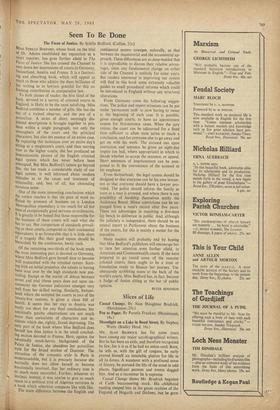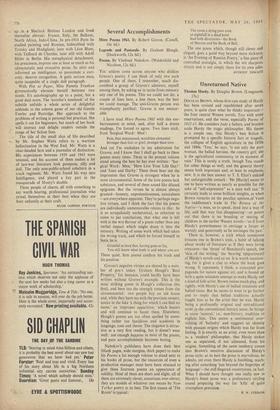Slices of Life
Casual Change. By Alan Houghton Brodrick. (Hutchinson, 25s.) MR. ALAN BRODRICK has for some years been among our major autobiographical writers. But he has been an exile, and therefore recognised by few, for it is as if he had no union card. Born, he tells us, with the gift of tongues, he early proved himself an insatiable glutton for life in all its forms. A wanderer with a profound sense of history, he pursued the life of the mind in odd places. Significant persons and events dogged him. And as a raconteur he is supreme.
Casual Change shows Mr. Brodrick begotten of Carib buccaneering stock. His .childhood reading steeped him in the gaunt realities of the England of Hogarth and Dickens, but he grew
up in a Sherlock Holmes London and lived thereafter abroad : France, Italy, the Balkans, North Africa, Indo-China. In pre-1914 Paris he studied painting and Russian, hobnobbed with Trotsky and Modigliani; later with Ldon Blum, with Teilhard de Chardin; later still with Adolf Hitler in Berlin. His metaphysical detachment, his prescience, impress one at least as much as his idiosyncratic and evocative prose. So alert and informed an intelligence, so passionate a curi- osity, deserve recognition. A gaily serious man, quite incapable of a single dull paragraph.
With Pen to Paper, Miss Pamela Frankau
gymnastically elevates herself between two stools. It's autobiography up to a point, but a good deal more. The 'novelist's notebook' of the subtitle unfolds a whole series of delightful addenda to the solemn game of our old friends Fowler and Partridge. Her approach to the problems of writing is personal but practical. She spells it out for beginners, but much of her book will instruct and delight readers outside the range of her fiction fans.
The title of the small slice of life described by Mr. Stephen Watts refers to a wartime hallucination in the West End. Mr. Watts is a clear-headed Scot and a journalist of distinction. His experiences between 1939 and 1945 were unusual, and his account of them makes a lot of last-war literature look pompous, silly and dull. The only non-public-school subaltern in a crack regiment, Mr. Watts found his way into Intelligence, and played a key part in the masquerade of Monty's double.
Three people of charm, all with something to say worth hearing, professional journalists who reveal themselves at their best when they are busy unfussily at their craft.
HUGH GORDON PORTEUS















































 Previous page
Previous page